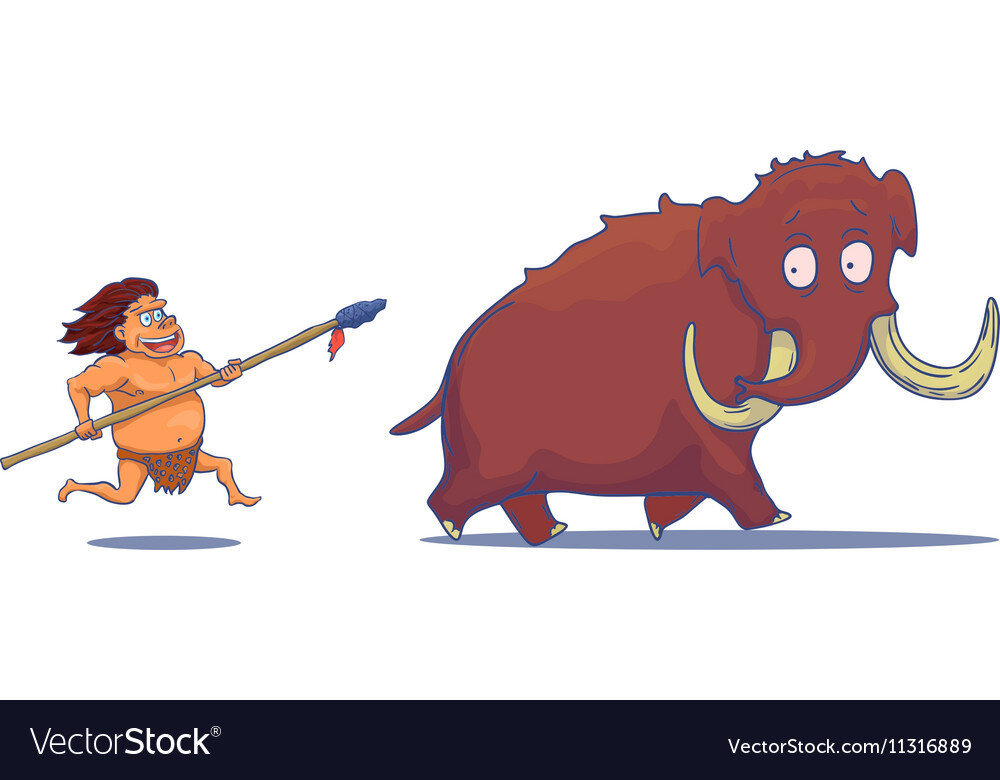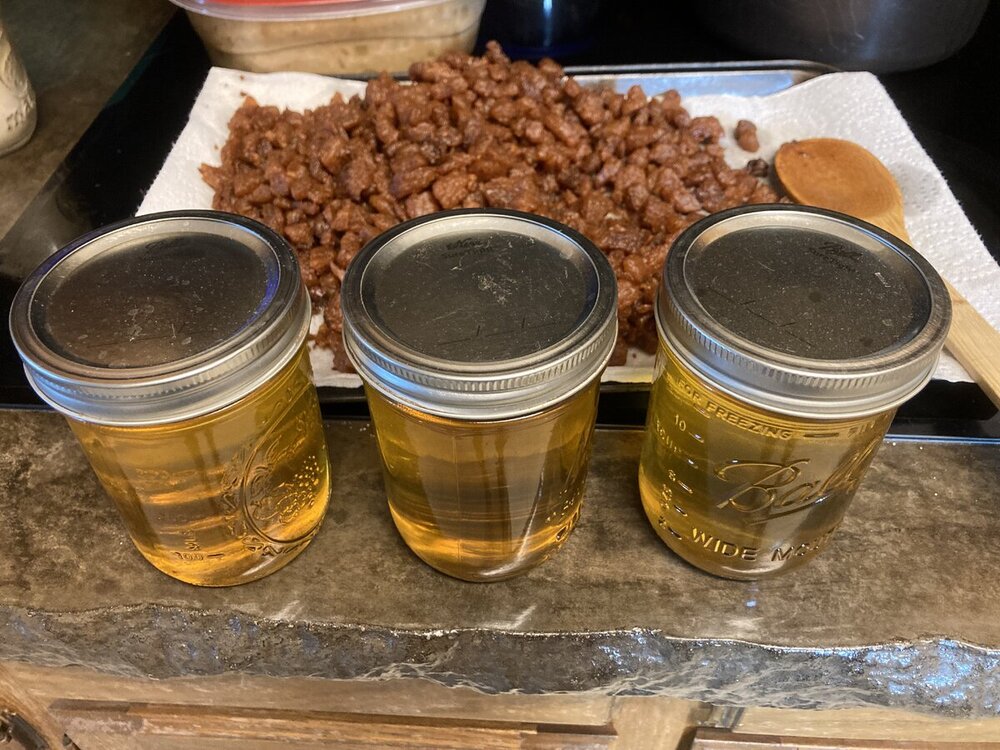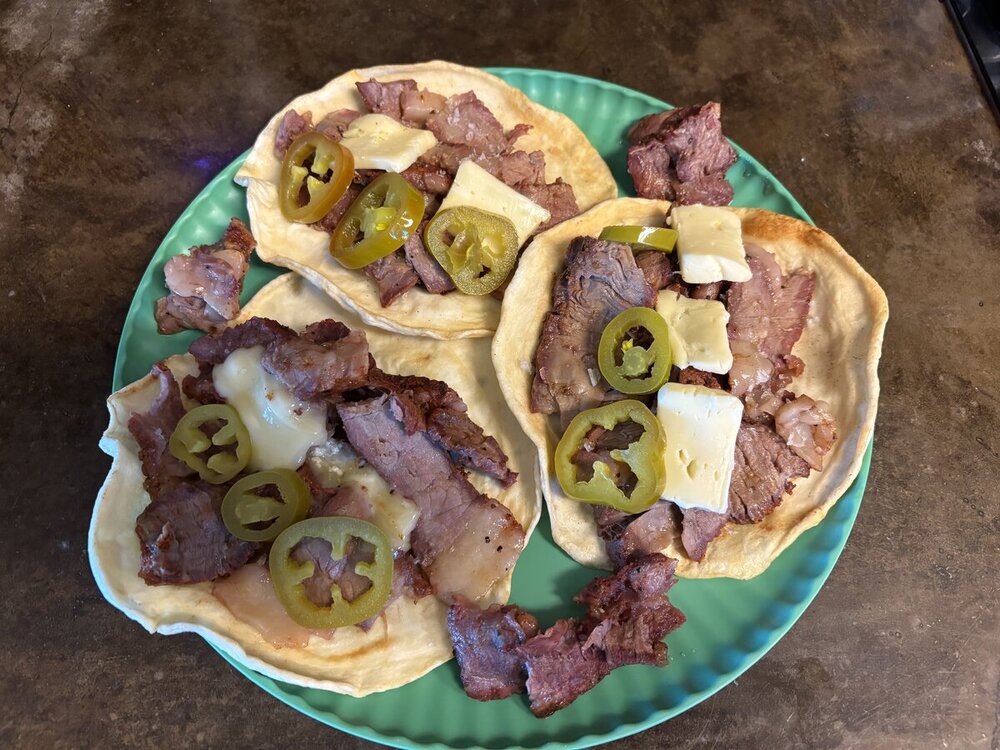
Everything posted by Geezy
-
Leg of Lamb anyone?
Absolutely it is. It’s a red meat just like beef and is best when rare. Some cuts can be a little tougher though depending on the age when it was slaughtered.
-
Labs
Ok, I get your why. I reversed my Crohn’s Disease and IBS so I can relate. You do what you need to do to get this behind you. Be hopeful that in time you will reverse this terrible illness. Sent from my iPhone using Tapatalk
-
Deep Fried Caraway Crusted Sirloin Steak with Pork Panko Breading
Looks great. I make chicken fried steak using panko and venison and it’s delicious. But as one who has sworn off seeds in any form I couldn’t do the caraway seeds.
-
Beef Suet
This is a very unique way of using suet. I never would have thought of eating it as a meal. I just don’t think I could do that though as I make tallow out of mine it would seem like a waste to me but I do have the rendered out bit of fat left over for snacking on.
- What Did You Eat Today?
-
Leg of Lamb anyone?
This is how my lamb comes packaged. Lol. I eat a lot of lamb and it’s good any way you can fix it. for a leg of lamb I prefer to slow smoke it using pecan until it reaches 165° internal. Then wrap in pink paper and continue smoking until it hit 203°. Let rest for an hour in a cooler and then eat and enjoy. A leg of lamb is traditionally roasted in an oven until your preferred doneness (rare to medium rare) and you can do the same on the grill but I just like mine fall off the bone tender.
-
Carnivore diet newbie
And that is how you do it. Sometimes even hour to hour or minute to minute. Keep up the good work.
-
Dill pickle chicken wings
Looking forward to the review.
-
Labs
Welcome to Carnivore Talk Craig. Yes, those numbers are fairly normal for a carnivore. In my opinion they are excellent. The true maker for cardiovascular disease is your Triglycerides to HDL ratio and yours are stellar. The number we like to see is under 2 and yours is 1. That’s great. As far as everything else I’d look at your supplements. You don’t need a daily vitamin. They are worthless and a waste of money. If you think they make you feel better then fine, continue taking them but just know that the way we eat provides all of the nutrients you need to thrive as a human. I eat organ meats but not as a supplement but just because I like them but I don’t eat them everyday. According to many of the experts, organ meats are not necessary to a proper diet. I don’t know why you are taking krill oil but unless you are trying to treat a specific issue in your body it’s probably not needed either.
- Just Joined- Looking Forward to the Community
-
Carnivore diet newbie
Welcome to Carnivore Talk Kat. You are off to a great start. We are all here to support you anyway we can so don’t hesitate to reach out.
-
Carnivore diet newbie
Thats can be a good way of staying true to your diet. If that’s what helps you then that’s what’s important. In the beginning I was all into making dishes that resembled my favorite foods that I left behind but over time I found that the meats alone were all I needed to enjoy my food. Of everything I’ve ever eaten in life I found that meat is the only thing I can eat and enjoy all by itself with no enhancements. I guess that’s what happens when you finally get to the point where you start eating for nutrition instead of entertainment.
- What Did You Eat Today?
-
Salt and electolytes
A definitive answer would be…maybe 😏. Sodium is only on of three essential electrolytes we may need to supplement. There is also magnesium and potassium. You will not get all three but just using salt. Of the three I do believe that sodium may be the most important. In the beginning of stating your carnivore journey you will usually be flushing fluids out of your body at a higher rate than ever before because you no longer have a fiver in your system to help you retain it. So when you flush that fluid you also flush out electrolytes. Many people find that they need to supplement those electrolytes back in for a period of time until they become fully fat adapted and their bodies adjust. Many find that as they learn to eat properly they can get what they need from diet alone and don’t need to supplement. I find that to be truer of younger people than older. If you are feeling tired, weak, cramping, not sleeping well or just generally feeling drug down you may need to up your fat intake and take some electrolyte supplements. I like to caution everyone to make sure they really need them. Most people just silly nilly take them just because everyone else is taking them and you may need to in the beginning but long term they could hurt your health. It’s always a good idea to get some blood work done and see if you really need to take them. I speak from experience on this as I was taking LMNT in the beginning and then switched to KetoChow, for cost reasons. After about 9 months of being a carnivore I had a bi annual physical and my blood work showed that I was in dangerous territory for potassium. Too much potassium can stop your heart and for someone with a heart condition that was bad news for me. So I immediately stopped the KetoChow. I do keep some LMNT on hand for those days when I’m going to be working all day in the heat but that’s to only time I take it. I have played around with some magnesium citrate for constipation and magnesium glycinate for sleep and cramps but for the most part all I do now is just liberally salt my food and salt my water once or twice throughout the day. I am also taking a daily dose of iodine as well.
-
Beef Suet
We have a recipe section if you would like to contribute to that but if you would like to create a thread detailing just one subject at a time that would be great too. I’m a bit of a cook myself and I like to experiment but I often find that many of the “carnivore” recipes the influencers come up with are just too complicated. Sometimes it’s just easier to apply the KISS method. Over time in my carnivore journey I began to slowly stop eating for entertainment and started eating for nutrition. That doesn’t mean I don’t still get creative or enjoy my food it just means that the reward isn’t always worth the effort. Such as bread recipes. I’ve tried them all and none of them are really worth the effort. In the recipe section you can see my tallow recipe I have. I make my own tallow and after I’m through rendering out all of the liquid fat out of the solids I have left over what I call fat bites. These are great heated up with a little salt as a snack or to get over a craving. They are also very good in scrambled eggs. It’s a great way to get that extra fat into the diet. So yes, I do use suet in my diet as well as fat trimmings. Not so much to eat so much but to make tallow.
-
Dill pickle chicken wings
I guess if you really like pickles that might work. I’m not a big enough fan to give that a go. I’d try one just to try it but I don’t see myself going out of my way to make those. Let us know how you like them though.
-
Is meat satiating or is sugar/carbs more of a trigger?
And that’s all that matters. This is your journey and you have done a great job of listening to your body and making the adjustments it needs.
- Sleight of hand
-
Carnivore/sugars and self experimentations
No thanks. I’ll stick with being a grunt. We only had to worry about getting shot at. [emoji1787] Sent from my iPhone using Tapatalk
- Sleight of hand
-
Is meat satiating or is sugar/carbs more of a trigger?
The sugar is putting you into a dopamine roller coaster ride. It raises your blood sugar and when it drops off it wants another “hit” so it turns on the hunger hormone Ghrelin. Eating fat is satiating because it suppresses that hormone. When I first started eating carnivore I couldn’t eat as much as I do now. I only eat when I’m hungry and like you, a pound of meat was about all I could stuff in but when I lost nearly all my fat is when my appetite increased. The reason is when we are fat adapted we only use fat for fuel but when we use up all of our body fat the body starts crying for more fuel than what your body can provide so it turns on the appetite. I try to eat 1.5 - 2 pounds a day but there are some days I still only want about a pound. There are five stages of carnivore The decision Adaptation Healing Ravenous Maintenance
- What is an acceptable ("safe") blood glucose level on carnivore?
-
Diarrhea and Loose Stools for Long Term Carnivore
Welcome to Carnivore Talk Sean. I have been carnivore for a little over two years myself. I will occasionally get loose but for me it’s because of too much fat. I’m not sure what it could be in your case since you’ve already experimented with your fat ratios but since this is an elimination diet you might look at what’s not essential to your diet. You might try dropping the LMNT for a while. The magnesium or potassium could be causing an issue. I personally don’t thing that someone who has become fully fat adapted should be taking a supplement unless they are deficient in something or trying to fix something. I was taking LMNT and the. For cost reasons I switched to KetoChow and a blood test showed that I was in the danger zone for having too much potassium in my system. Now I only take LMNT when I know I’m going to be out in the hot sun working all day and sweating. If I don’t I’ll end up with muscle cramps. The other thing to look at would be your coffee consumption. I know that’s a hard one to give up but I could be worth a try. But I’d try giving up the electrolytes first.
-
Carnivore/sugars and self experimentations
Go Army! I just couldn’t see myself being stuck on a ship with a bunch of dudes floating on the ocean six months out of the year.
-
new to canivore diet - any known issues with this diet while on pembro immunotherepy for melanoma?
Welcome to Carnivore Talk Dave. Yes, absolutely, carnivore is the best thing you could be doing for yourself if you have any form of cancer. It is also the best thing to heal your metabolism to help heal. Check out this short video from Professor Simon Seyfried on ketogenic diets and cancer. Sent from my iPhone using Tapatalk





